This is the tenth of our instructor-led online discussions for Mu 101 (Fall 2019). Refer to the handout you received the first day of class (click on this highlighted text to go to that page our class website) which describes the amount and kinds of contributions you’re expected to make to these online discussions — they’re all the same parameters of good conversation that happens offline, too!
BEFORE WE BEGIN: A REMINDER ABOUT EFFECTIVE DISCUSSION FORUM PARTICIPATION
Most importantly for blog-style discussions, do not try to respond to every idea in this post. Focus on the ones that you have a strong reaction to, and learn from other people’s comments that address the other questions. Leave space for others to move the conversation along. There is no prize for trying to do it all yourself.
Limit each of your comments to addressing a single question or topic. By doing so, you make it easier for others to see your point quickly and easily, rather than letting your good idea get lost in the middle of a long, multi-topic post. If you have several different ideas you want to share, make several different comments. Let each idea speak for itself.
There are no questions at the end of this post to get the conversation going. Use your own critical thinking to make this conversation substantial: compare or contrast its ideas to your own experience or other things you’ve learned about, think about what surprises you, and think about what aspects resonate with or contradict your own experiences.
The approximate reading time of this post is 12.5 minutes, not counting any audio media. As with all aspects of music and music making, the economics of classical music vary from place to place and across historical periods. This discussion is an introduction to the trajectory of music history in the West (i.e., Europe and North America) for the few hundred years our course material covers. If any of this material is review for you, this in opportunity to incorporate a layer of music to your background knowledge! If you haven’t taken a history or economics course that covers these topics, use the embedded links throughout the blog post to fill in gaps in your understanding.
But, economics in a music class?
Economic factors—such as who has money, how much they have, how they spend it, and why they spend it—determine the way that music is made, what it sounds like, who listens to it, and the circumstances in which people experience music. They lurk behind all the various musical sounds we hear, and knowing a little bit of economic history can give our ears insight into the how and why behind much of the music we encounter.
There is no art without economics. Music, just as with the other arts, requires monetary support. This includes funding for obvious things like supplies (instruments and repairs, scores, paper, rehearsal space), education, and training costs. It also includes less obvious things such as some degree of financial comfort — without, for example, the stability of a warm home and food, a person is less likely to be able to devote time and energy towards making music because their attention is focused on fulfilling more basic needs. (This idea comes from Abraham Maslow’s 1943 article “A Theory of Human Motivation.”)
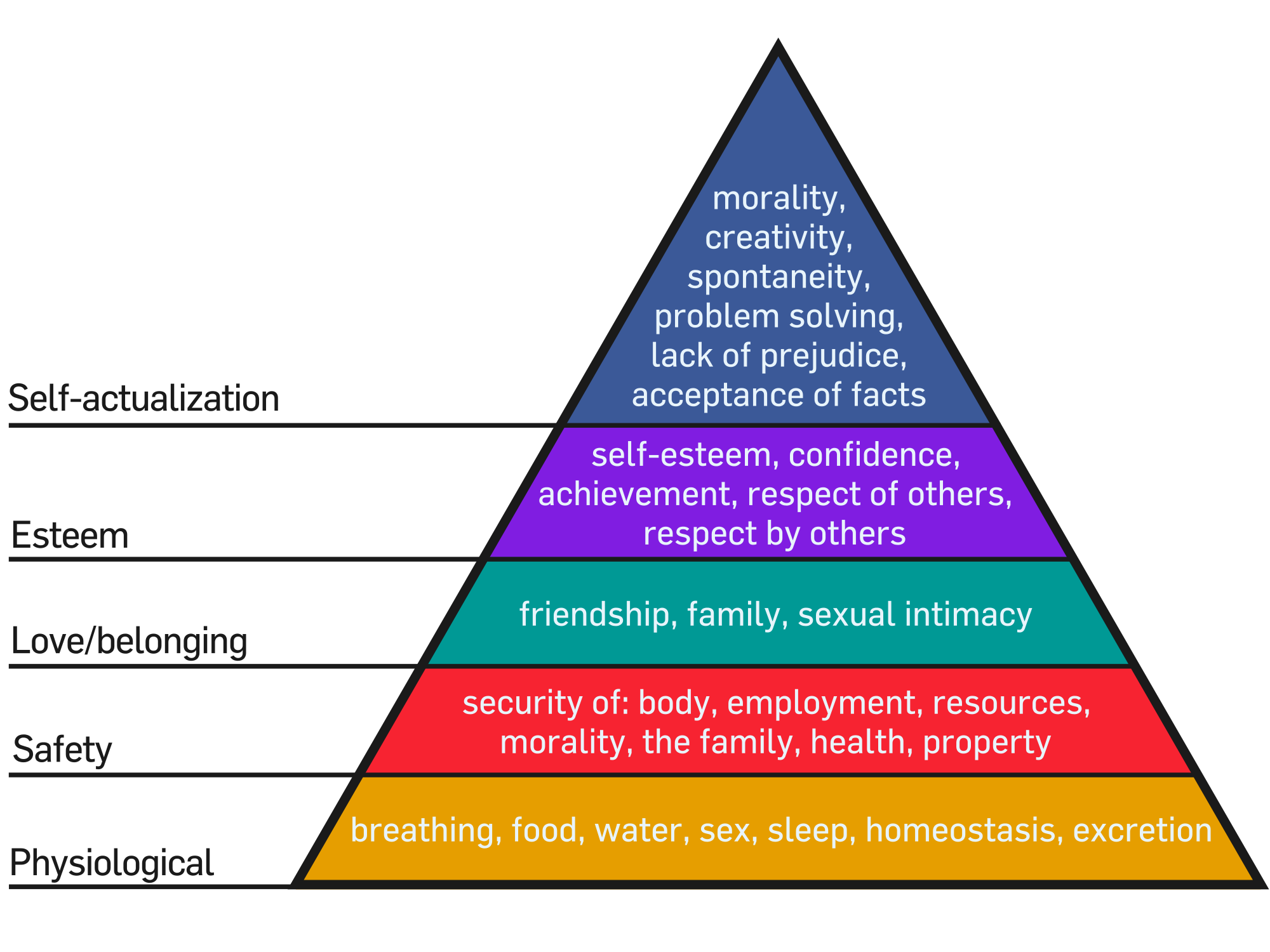
The patronage system
For most of the European continent’s history, the countries we think of as being “European” didn’t exist—e.g., France, Germany, Italy. Instead, the land was divided into multi-ethnic empires, city-states, and nomadic groups. Nations as we now know them were established in the late-18th and 19th centuries as a way to unify groups of people who shared a linguistic heritage and other common cultural features, along with geographic proximity. Kings existed, but they didn’t hold the real power (meaning wealth, military strength, or direct control of the land where food was produced); real power was wielded by aristocrats (noblemen with various titles: duke, viscount, baron, earl, lord, prince) or the Catholic Church.
And everyone else? The majority of the population consisted of peasants, and they worked in the fields generating the wealth of said aristocrats.

Part of the value of being wealthy and powerful is letting other people know that you’re wealthy and powerful. It creates a sense of respect, a healthy dose of fear, and a social class identity. One of the ways that the aristocracy and the Church were able to demonstrate their might was with the art that they commissioned, displayed, and controlled: they were the patrons of the arts, and the patronage system was the economic structure in which art was produced for these patrons. (A great background to the division of societies into people who produce food, rulers, and artisans/religious figures who consolidate those rulers’ power is the 1999 book Guns, Germs, and Steel by Jared Diamond).
Art (including music) wasn’t just a pleasant diversion or pastime under the patronage system—it was part of PR and image control for those in positions of power: a status symbol.
Architecture, for example, was used to demonstrate might and financial resources.


The visual arts captured a patron’s image for posterity. They often include not only sumptuous attire (rich fabrics, intense colors, and intricate details) but also depictions of music making, because it was believed by members of the noble classes that musical talent and musical taste proved how worthy a person was. (Remember, most noblemen and noblewomen learned to play an instrument as a hobby.)
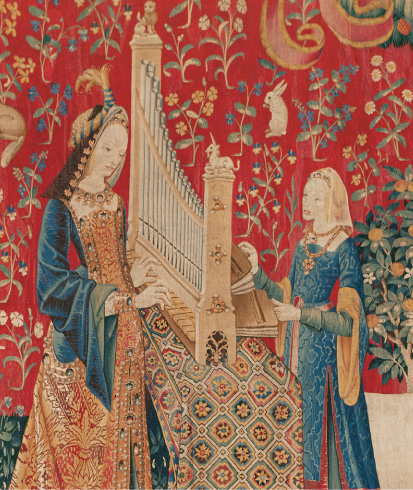
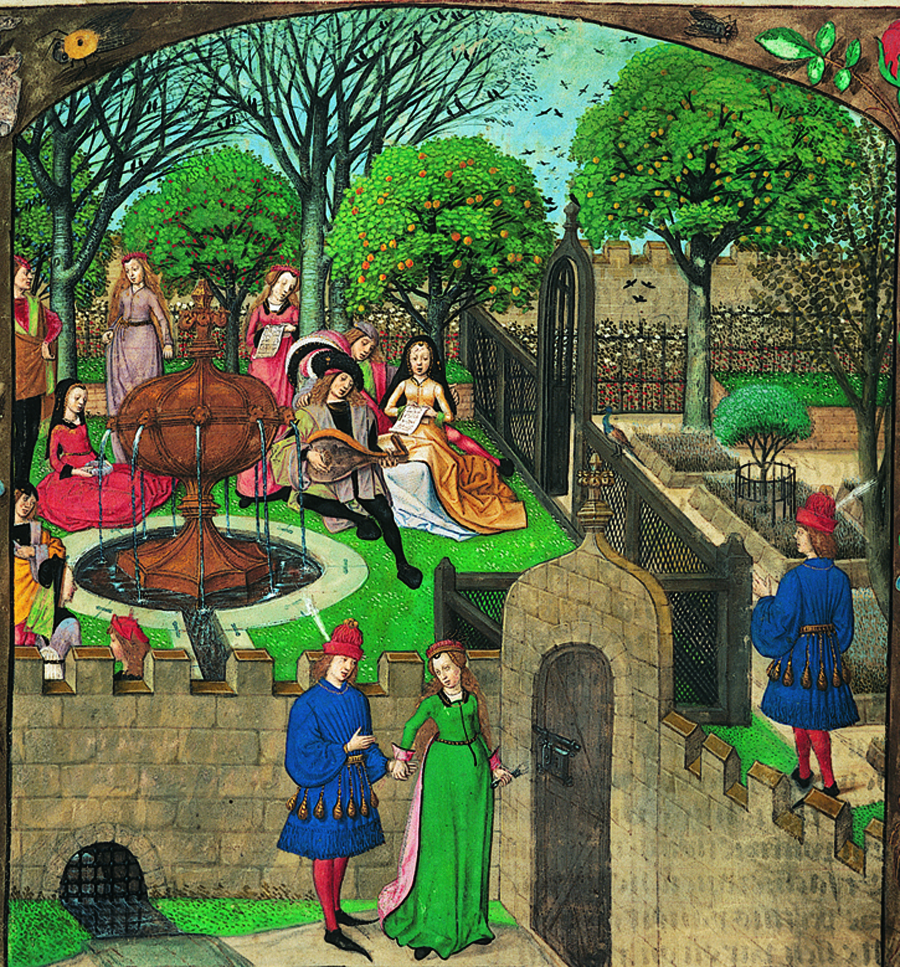
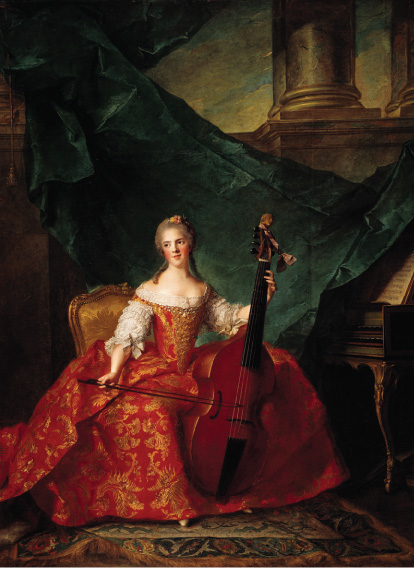
To be a musician under the patronage system meant to hold a job post at a patron’s center of power: a cathedral or an aristocratic court. This form of employment was a lifelong commitment, and a musician would earn a salary and also receive a uniform, be provided with supplies to make their art (staff paper, ink, instruments), and be housed and fed (including firewood for the winter). A musician’s duties were often extensive: a composer (with a job title like maestro di cappella in Italy, surintendant de musique or maître de musique in France, or Kapellmeister in Germany) would also be required to teach, perform, and oversee other subordinate musicians (hiring and firing). In return, the patron had final say on everything their employee did: travelling, permission to sell sheet music, and what music was made (more on that below). Johann Sebastian Bach’s contract with the town of Leipzig, where he was in charge of composing music, rehearsing music, and coordinating musicians for the town’s four churches was typical of the time: bach-duties-in-leipzig
It was also often in a patron’s best interest to allow their musicians to travel and publish sheet music—the fame and respectability of their employee would reflect positively on the patron and add more prestige to their reputation.
Economics, taste, and self-expression
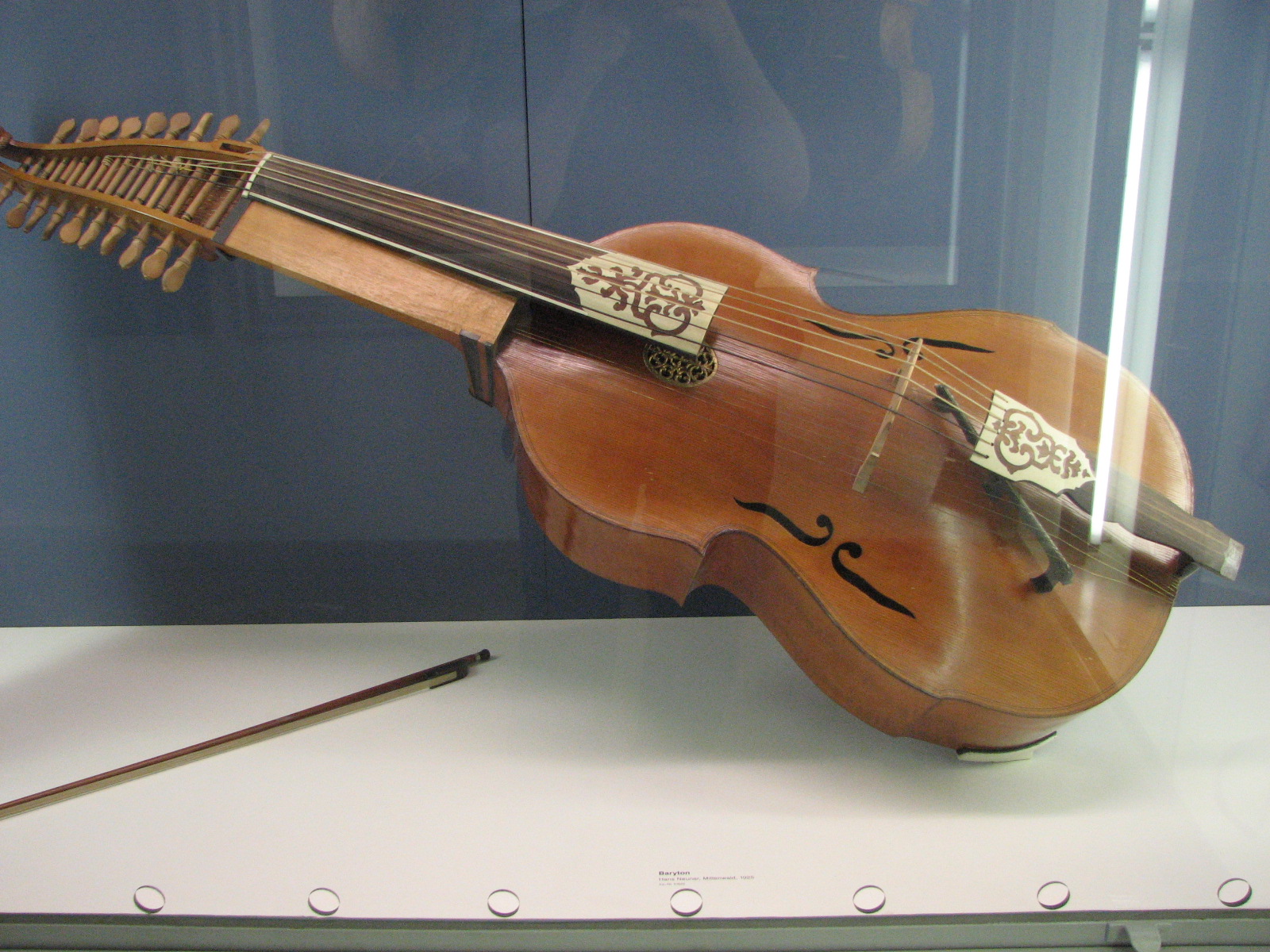
Music written for a patron was designed to suit the needs or taste of the patron. If the patron loves the baryton (as Joseph Haydn’s patron did), a composer will write a lot of music for the baryton (Haydn wrote 72 trios for the instrument, even though no one else was doing it anywhere in the world). If a patron loves dance music (like King Louis XIV of France), then their composers and musicians need to be really good at creating and playing dance music. If a composer writes music their patron doesn’t like, the patron will tell them not to write like that any more, and that will be the end of that.
Something that you may find disconcerting or uncomfortable at this point is the realization that much music that exists in the world isn’t written for personal expression—it’s a job. The contour of a melody, the emotions conveyed by the harmony, or the instruments used aren’t necessarily an expression of the composer’s desires, just what he knew would keep him employed—they express the taste preferences of whoever was footing his bills. And that means the history of music is often a documentation of the taste of wealthy individuals—people with the means to commission and preserve the material culture of music.
The rise of nation states and shift to free-market capitalism
We don’t live in strict patronage system any longer, and that makes it seem like musicians are free to create whatever they music they want—they don’t have to please a king or aristocrat who is their lifelong employer. Bring on the self-expression!
Not so fast…
The shifting political-economic landscape in late-18th and 19th centuries simply means that music is now treated in a different way. The musician’s role in society becomes one of selling goods that the public may or may not buy—it still all comes back to economics!
Public taste is volatile (particularly when ideas are able to spread more and more quickly, as the Internet now allows), and this means that some musicians try to suit public taste (for example, commercial jingles, soundtracks, and pop music) while others simply make what they want to make, with complete disregard to whether or not consumers like it.
“The people who don’t want your music don’t change their minds. You outlive them, if you’re lucky.”
—Philip Glass, composer (b. 1937)
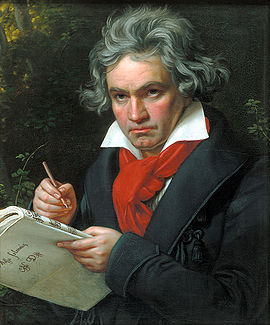
Ludwig van Beethoven (1770-1832) navigated this economic transition by using both the patronage system and the emerging capitalist markets to his advantage. He threatened three Viennese aristocrats (who loved his music and loved having him in their city) with a job offer he had received to join a court outside of Vienna. Under fear of losing him, these aristocrats caved to his threat and agreed to pay him a healthy annual subsidy to remain in the city with no other strings attached. Beethoven also shrewdly published his music simultaneously in multiple countries at once—there was no such thing as copyright law at this point, so if Beethoven had sold his work to an Austrian publisher, for example, there was nothing stopping a French publisher from copying it and selling it themselves. Beethoven’s business acumen beat them to the punch and took advantage of the fact that he was well-known across Europe, with consumers everywhere clamoring for his music.

Pianist Clara Schumann (1819-96) was able to support her family of 8 children and her mentally ill husband, the composer Robert Schumann (who is the first person who’ll come up if you Google “Schumann”—not Clara) through her rigorous touring schedule. She performed widely and to great acclaim across Europe right up until her death, and this was how she navigated the free market.
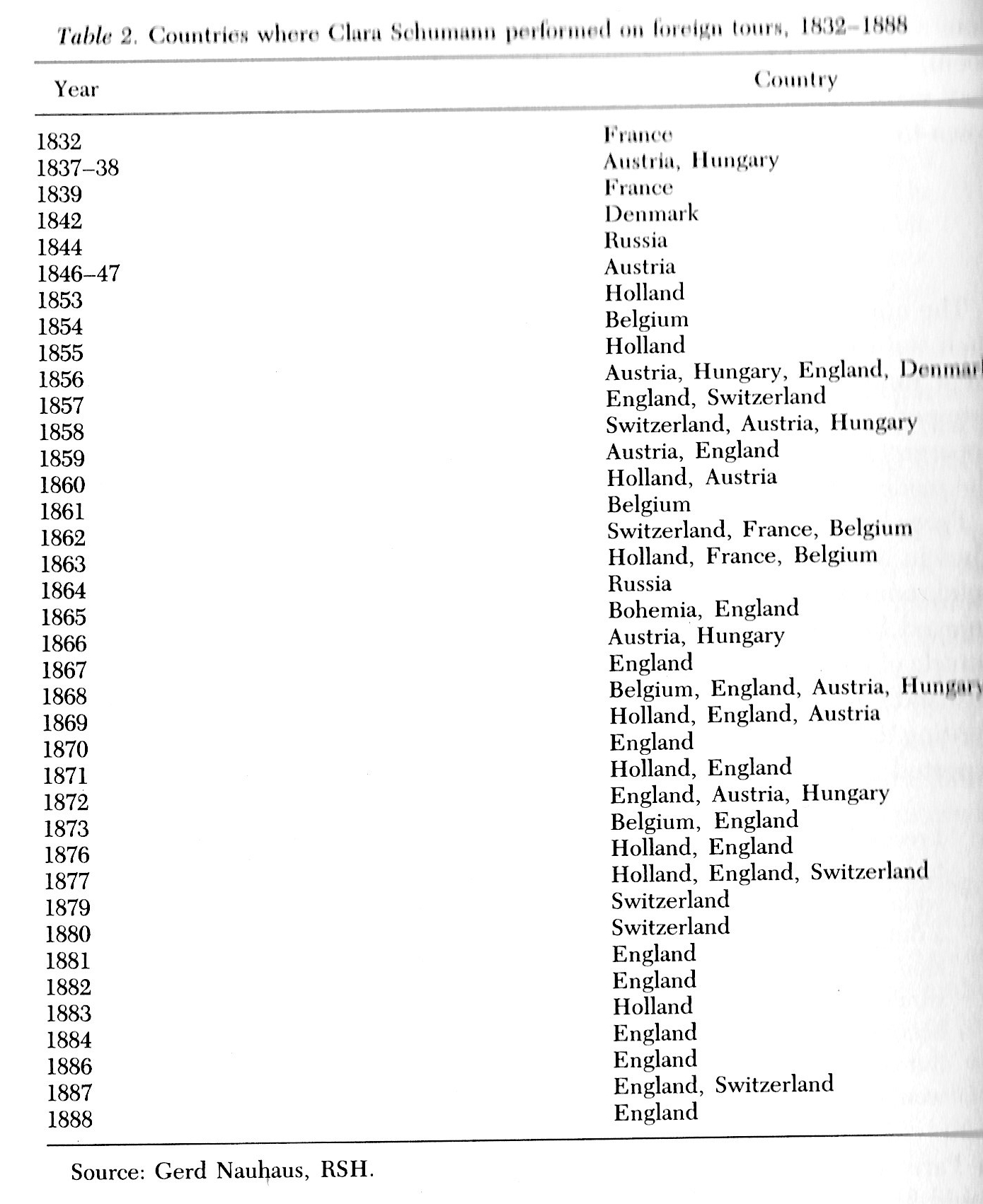
Musicians today: the gig economy
An ideal situation for many modern musicians is holding a steady position with either an orchestra (as a performer or conductor) or a university or conservatory (teaching composition, performance, music theory, music history, or some combination of those subjects). The best jobs in these fields pay quite well, but there aren’t very many opportunities to go around. The next few paragraphs deal with orchestral performers, but the same issues are true for composers and professorships.
As assigned reading, we read a 2012 article (dorris-the-audition) that describes the lengthy, exhausting process of preparing for orchestral auditions: how much time it takes, what a player does to prepare, how they earn a living while trying to win a job, what happens after they win a job, how few jobs there are, and how much money orchestral musicians make. It is an easy read and features Mike Tetrault, an orchestral percussionist.
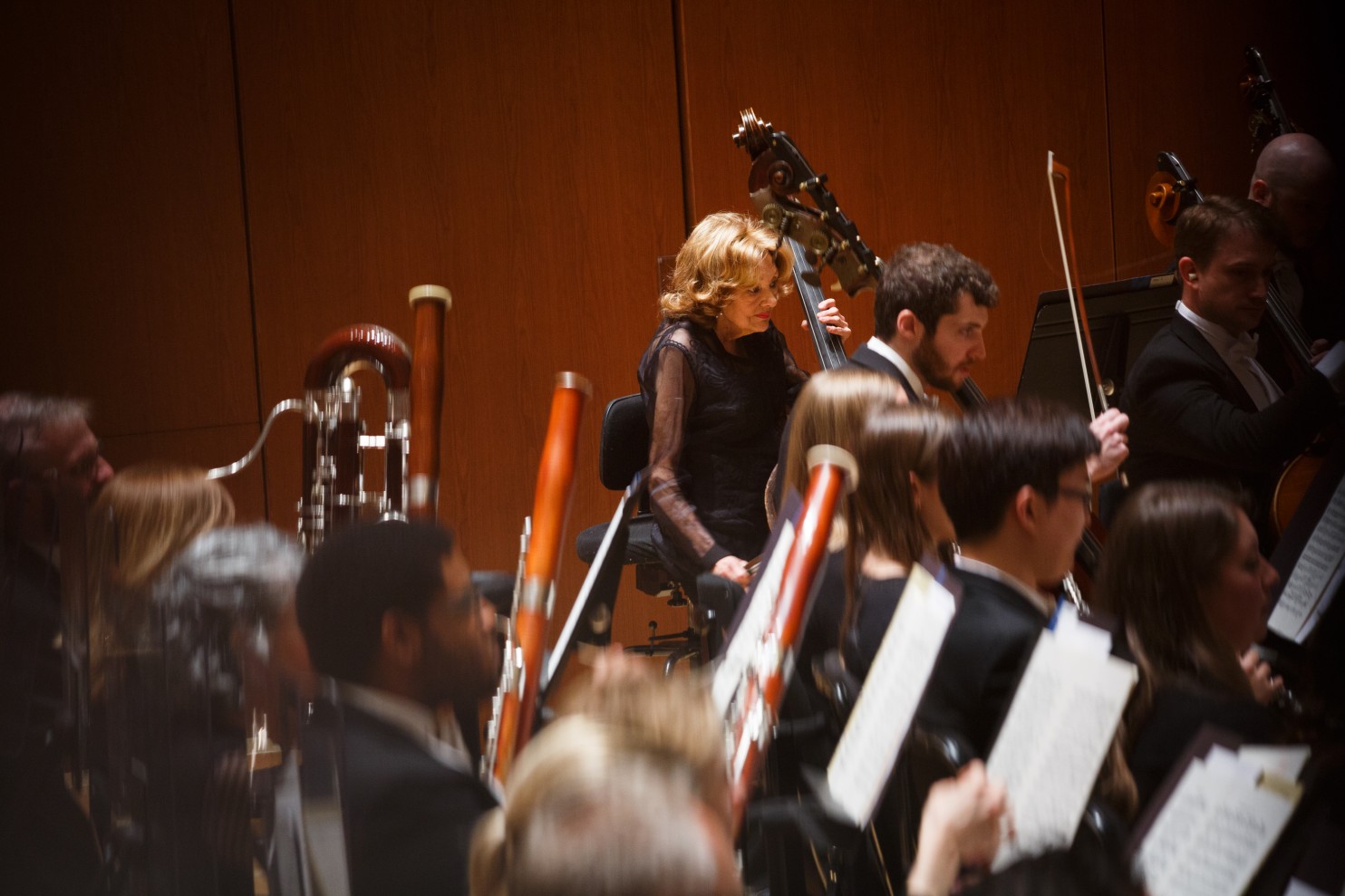
Musicians in the top US orchestras earn around $100,000 per year (depending on where the orchestra is located; players in Alabama earn less than those in Chicago, for example), and that shows how valuable and rare high quality orchestral playing skills are. There are very few top orchestras, however, and there are only 20 orchestras in the US whose average salaries are over $55,000 per year.
Demand for these jobs is high. There are 117 symphony orchestras in the US. That means there are approximately 11,700 orchestral job positions in the US, assuming each orchestra has 100 players, which is an over-estimate. But that’s not the same as saying there are 11,700 job openings there are every year, because once someone wins a good orchestral job, they hold onto it for 30-40 years. For flute players, for example, there were only 4 job openings in the US in all of 2015-16.
There are approximately 60 college-level music schools or conservatories in the US, and they typically train musicians to enter a specialized career trajectory of being an orchestral player or opera singer. Each school will graduate a class of around 150 students each year —that’s 9,000 students every year.
Add all those graduating students to the musicians who haven’t won an orchestral job yet (say, 8,975 from every previous year), plus international musicians…
Uh-oh.
Instead of holding a single, steady job, the typical modern musician’s career is a prime example of the gig economy: cobbling together a living wage from several small revenue streams, none of which is sufficient on its own, none of which provides benefits like health insurance or retirement savings, and none of which is guaranteed to continue.
- Concerts— Musicians may be paid by a venue or concert series for their appearance, they may take home ticket sales, or their performance may be organized by a management company. A concert payment for a musician can range from $0 to $4,000, but most concert performances pay $100-750 per player. This also includes many orchestral jobs outside of the top orchestras, which are paid “per service” rather than a salary (around $40 per rehearsal and $150 per performance).
- Commissions— Composers charge commissioning fees when someone asks them to write a work. Rates depend on the length of the piece (longer = more expensive), the number of musicians (more musicians = more expensive), and how famous the composer is (more famous = more expensive). The commission fee may range from $2,000 to $100,000, depending on these factors. Often, groups of performers will form a consortium to commission a work and divide cost among all members, so that no single player has to bear the weight of the entire expensive commission themselves.
- Teaching private lessons— A musician recruits students to take individual lessons (in performance, conducting, or composition), finds space to teach in, prepares lessons for each student’s individual needs and desires, keeps students and parents happy, and organizes performance opportunities for their students. The cost of a one-hour lesson varies based on geography and teacher: $15 (in Texas and the Midwest), $60-75 (typical in NYC), $250 (for lessons with the most famous teachers in NYC).
- Teaching in community music schools— All the work of recruitment and infrastructure (and sometimes curriculum) is taken care of by the school rather than the teacher, but the teacher earns less per hour (in NYC students pay around $70, but much of it goes to the school itself and the teacher takes home around $40). There are several such schools in NYC: Brooklyn Conservatory of Music, Lucy Moses School at the Kaufman Center, Bloomingdale School of Music, Third Street Music School, and Turtle Bay Music School.
- Teaching primary education— This includes band directors, orchestra directors, and choir directors in elementary, middle, and high schools. The average NYC public school music teacher makes around $50,000 per year.
- Teaching secondary education— Most college and university instructors teach at more than one campus, and most positions are adjunct (hired just for that class or semester with no guarantee of being rehired). Some schools pay only $1,500 for a semester-long class; CUNY schools (depending on the highest degree a teacher has earned) pay up to $4,000 per class per semester (this page gives adjunct salaries by the hour).
- Grant writing — There are several foundations and government organizations that support the arts and music making, and they award money (ranging from a couple hundred dollars to millions of dollars, depending on the organization) for the creation and public sharing of artistic work via a competitive application process. Here’s a taste of what grant writing is all about.
It takes a lot of these activities to add up to a living wage, and booking one gig doesn’t guarantee that there will be more work in the future. Many musicians work “day jobs” that allow them to practice, rehearse, and gig at night: dog walker, yoga instructor, grant writer, administrative assistant, baby sitter, paralegal, plumber, or insurance salesman. Sometimes these day jobs take over, and a musician stops being a musician entirely.
Online streaming: the promised land!
You may have noticed that I left out online streaming as a source of revenue for the average classical musician working today. That’s because it typically doesn’t pay well for anyone, regardless of their musical style—the average pay is $0.0025 per play—less than a penny.
When a musician’s recordings are played on various digital platforms, we as consumers generally pay little or nothing for the experience. YouTube, Spotify, and Pandora all include advertising on their basic levels of service (free for the consumer); it seems like artists are probably compensated for their work through ad revenue and that popular artists make significant money for their efforts because so many people are listening to their music. However, these business models pay musicians very little: Spotify pays between $0.006 to $0.0084 per play; Pandora pays either $0.0014 (non-subscribers) or $0.0025 (subscribers) per play—and depending on an artist’s contract with their record label, they’ll receive only around 40% of that money. The songwriter for “All About that Bass,” sung by Meghan Trainor, is Kevin Kadish. The song was unequivocally popular in 2014 and was played 178,000,000 times on Pandora, but for this Kadish received a check for $5,679; another songwriter whose work was played just over one million times was paid $16.89. The less-popular but still successful band La Roux earns approximately £100 for three months of streaming. Taylor Swift doesn’t include her music in Spotify’s streaming catalogue for this very reason—it devalues the art:
“Music is art, and art is important and rare. Important, rare things are valuable. Valuable things should be paid for. It’s my opinion that music should not be free.”
It’s also worth noting that Swift is in a position of considerable privilege—she can reject the means by which less-established or less well-known artists connect with new listeners because she is already successful and also because she makes money via other avenues, such as ticket sales for her live shows.
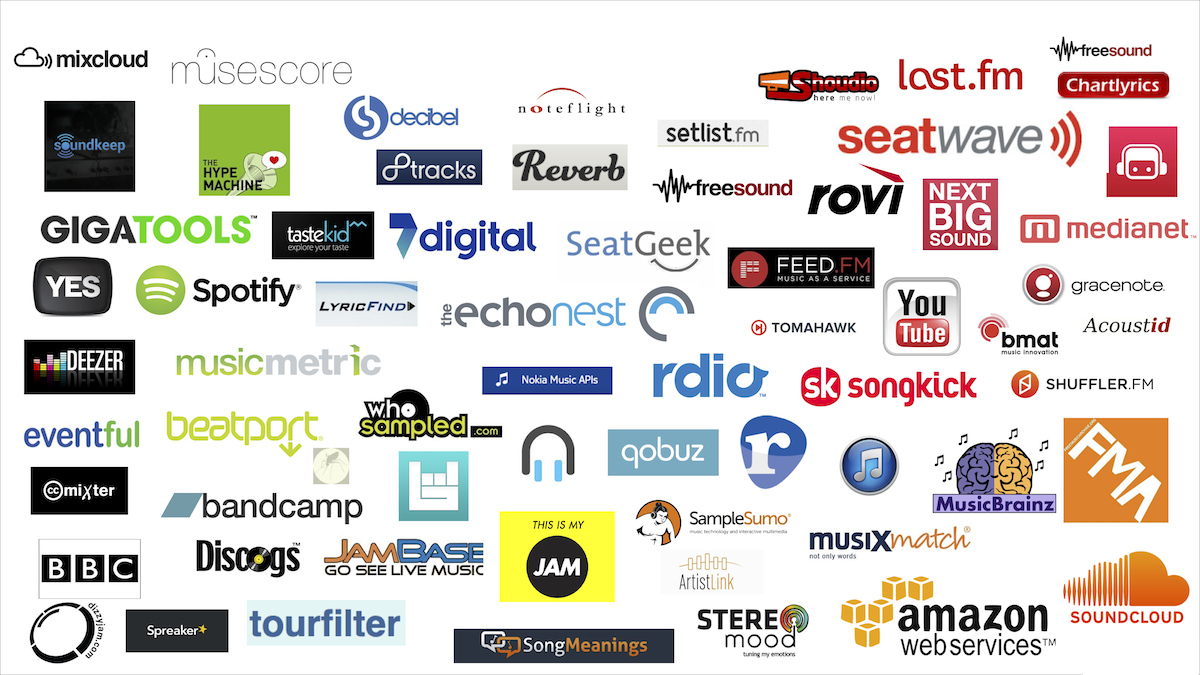
The irony of recorded music being ubiquitous in our lives (meaning that we can’t imagine our daily activities without it and that we prize its perfection) is that it seems we value it less than ever.
Final thoughts
Making music is more complicated than just being inspired and sharing sounds with the world. Oftentimes the most financially successful musicians aren’t necessarily the most talented, the most interesting, or the most artistic—they’re the ones whose skills (musical and business skills) aligned with the economic demands of the time and place in which they live. The music we’re left with over time is the music that was created in courts and churches that had the means to fund and preserve copies of sheet music over several centuries (not necessarily the best music), and the music we come across on the radio or digital media is often also the result of a musician being aligned with record companies, management, or promoters who have the economic clout to ensure that their music is heard—again, not necessarily the best musicians.
-Dr. J.

A lot of people are capable of creating really good music, or singing really good songs, but don’t have the money to do so, so we are stuck with people who have the money to create music and sing songs, but there could be people who can do it better than them that go unnoticed.
LikeLiked by 2 people
you are absolutely right as older folks would say you have to have money to make money , because if you don’t have that money for studio time and all that comes with creating music you don’t stand a chance
LikeLike
True
LikeLike
Or they encounter pockets of fame via youtube by covering songs better than the original.
LikeLike
i also agree. To make a song that requires money. Some people may say it does not require much but we stress quality over everything.
LikeLike
Totally. In our roundtable discussion yesterday, we discussed the way that certain people have such an easy time entering a field due to their preexisting fame. Any singer nowadays can score a gig as an actor, and they will be hired over a talented unknown professional. Beyonce was instantly cast as Nala in the live action lion king movie, potentially stealing the role from an unknown actress. Casting calls and auditions become less common for movies and musicals as companies know big name actors will attract more attention, and therefor, more money.
LikeLike
That’s the sad truth of castings now a days. It’s all about what brings the most money in return. Which is unfair to other undiscovered talents out there.
LikeLike
ohh, i think you talking about the new Trap/Rap artists. People with money but can’t creat good music. LOL
LikeLike
Artist can still make music having no money. I saw people making music from home and when they have small amount of money coming in they turn a room in there house into a studio, and make music. From there they start going up. You just have to have talent in you.
LikeLike
I strongly believe that music should not be free , musician have to invest a lot of time and money in order to produce music. Music is therapeutic for many of us so why not pay for something that alleviates our mood swings . Pharmaceuticals charges big bucks for there medication for mental health and depression , So musicians should be well paid as well for the natural stimulants they gives us.
LikeLiked by 1 person
What happens when the musician passes away? Can it be free then?
LikeLiked by 1 person
I don’t think so the family should inherit their legacy
LikeLiked by 1 person
I think that if a musician works hard to earn their money, they should be able to die knowing their descendants will have financial security due to their efforts.
LikeLike
Very often, musicians abroad will pass-away and the family find themselves collecting money to bury them. All their stuff, collectables will go for options at the blackmarket.
LikeLike
I don’t think if I musician pass way his/her music should be free because that musician is not the only one who is benefiting from their song being played, stream etc, but there’re also the songwriter, producer and who else contribute to creating that song.
LikeLike
I totally agree that musicians should be fully compensated for the music they produce! But there are ways to do that which do not always require direct payment from listeners! Youtube is a great example of this. You don’t have to pay any money to listen to a song through youtube. However, you may need to watch an ad. Youtube makes money off of their advertisement capital. Companies pay youtube to show their ads and youtube takes some of that money and returns it to creators as compensation for creating videos that get lots of views. I do think it is important for music to be accessible to all people, and they should not always have to pay for it. We also learned in class that the government sets aside a certain amount of money for the arts, music included. While the federal government in america provides very little, the state of new york gives grants to music organizations so they are able to put on free shows for the public. So there are ways that music can be free to the public where the artists also fully compensated.
LikeLiked by 3 people
I agree.
LikeLike
I agree with that statement 100% that music should not be free, musicians put too much time and effort into making music and it just to end being free, would be a disadvantage for them. One major reason why music shouldn’t be free is because creating music is there job. What’s the point of working if you do it for free?
LikeLiked by 1 person
How do you know music is guaranteed to work for everybody? maybe that’s why the Pharmaceutical companies know they can charge so much for drugs because they know their drugs will be guaranteed to work, And most people are often looking for a easy, fast, and effective solution- then we become addicted just like that and before you know it it’s harder to go through withdrawals than it is to deal with having anxiety. And just like that- CVS pharmacy has a lifelong costumer. Why would a distributer make a product inexpensive if there is a high demand for a product?
LikeLike
For the most part music has a cost. Unless published for free it has a cost. A price has to be paid to hear classical music and ensembles at a theatre or a song on apple music.
LikeLike
Free music gives everybody a change to learn about thw arts especially young High school students. Spotify should pay artists more if that’s the case.
LikeLiked by 1 person
Well that’s true too
LikeLike
Where would they get the extra money from?
LikeLike
From the state
LikeLike
Music programs in schools and colleges gives the community a good experience
LikeLiked by 1 person
i agree, especially in poor/low income communities. Not only good experience, also gives opportunities to trouble kids to participate in positive activities like music educations. As a result, they will stay away from the streets and gang life.
LikeLike
Yea
LikeLike
spotify gets their money from advertisements. I think a thirty second ad is a fair price to pay for music that is otherwise free
LikeLiked by 2 people
i was not aware of that fact. That is interesting to know. I thought only youtube does that.
LikeLike
Not only YouTube has advertisements. Pandora does too . Unless you pay the 9.99 for YouTube music or 6.99 for pandora. Which will give you the luxury of actually listening to music without ads. Nothing’s is free in the world we live in .
LikeLike
I agree with what you are saying , because nearly every artists new or old to the music industry uses spotify to have their music be seen.
LikeLike
Maslow’s hierarchy of needs shows that we have to reach to the top of the hierarchy in order to create good music and for poor people it’s not so easy to reach that point may be that’s why rich people have been more successful making music.
LikeLiked by 1 person
Of course. In life you have to learn to prioritize different things.
LikeLike
Rich does not have to worry about money and can spend their time learning music history and other helpful stuff in becoming more efficient in making music while poor people have so much going on in their mind. For example when someone is hungry for food his/her hunger for music will go far away.
LikeLiked by 3 people
True. Sadly, this is the world we live in.
LikeLike
This is some truth! Because some of this is mostly why I changed my major from music to liberal arts (with a concentration in English). I am in no position to be grinding through more struggle. Tuition is costly as it is. Some would say I am not built for it. Though, I have a strong admiration toward those musicians who grind, never give up and succeed.
I wish all music had value to it, just because people go to college for it and study their ass off trying to become a musician. But I do appreciate the fact that music made by nobodies, in many ways, can change popular sounds into a different direction. I think this is why I appreciate the artist who make music not caring who likes it or now and its a plus if everyone just happens to catch on.
LikeLiked by 2 people
Music should not be free because music can be a source of income. People should benefit from there god given talents. Music is a source of entertainment and people pay for entertainment.
LikeLiked by 2 people
i agree with this, how would the artists get paid if music was free? if it was free to go to a taylor swift concert how would she get paid? yes free music would be nice, simply because its free! and i feel like that devalues it even more so. if i truly value something I have no problem paying for it.
LikeLike
My question for everyone would be is, if you took music serious as a career would you want to get some type of compensation?
LikeLiked by 1 person
that is the whole idea of being talented and playing at a profesinal level. musicians should be paid for their work and efforts. A talent is only for the very few gifted individuals. therefore, if you want my services, you must pay for it.
LikeLike
Yes absolutely
LikeLike
If I were to take music as a career I would like to get some type of compensation because at the end of the day. I would like some type of reward for my efforts.
LikeLike
I personally think when musicians die their money and instruments should be passed on to love ones or if the love ones don’t need the money then they can give it to music schools and the instruments can be sold and given to the poor or even other musicians who need the help to improve what they already have .
LikeLiked by 1 person
And I agree with Evan music should not be free.
Just like being a chef . They don’t cook for free so why sing and play an instrument for free?
LikeLiked by 1 person
Food is consumed
Once not repeated a million times a day. $50 per steak for one time. .99 for a song played all over the world a million times a hour
LikeLiked by 1 person
If you add that up, i think it is lots of money in the long run.
LikeLike
So artists who have many cars and mansions don’t get paid enough from Spotify ?
LikeLiked by 1 person
Most of the money they get is not form the streaming on line, it is from the live shows, the endorsement and the club appearance.
LikeLike
Yes so they get paid from
Spotify
To advertise their music and suggest it. To promote artists also in playlists suggested to listeners.
LikeLike
I’ve read a article where it said Spotify artist don’t get paid a lot. For every million views they earn $6,000 and for them to earn revenue it takes quite some time.
LikeLike
Yeah but those with many cars might have other contracts that they do get a lot of money from like commercials, special appearances, concerts, acting etc. but not everyone is so lucky. You also have the artist who don’t sell as much, or arent in a super popular genre, or even the writers to these songs we love so much.
LikeLike
Cash is king as I’ve heard many of times throughout my life and it does apply with music too. In a sense this can be used as a form of censorship especially back in during eras we are studying. If a piece of music that was composed was felt as if it offended the patron they simply wouldn’t allow it to be put out for others to hear. So, a question that pops into my head is….. How creative were these composers if they had some restrictions? If they were great with restrictions how great would they have been without restrictions hindering their talent?
LikeLiked by 2 people
Being creative let the artists to always look for several ways to make works.
If there were no restrictions for their creativity, I think there would be scandals or “haters” expressing their dislike, but it is not something that is not happening right now for some artists, even with restrictions.
LikeLike
I guess restrictions and cencership kept the musicians on their best games. To me, it made composing very competitive at the time.
LikeLike
Music would never be free do to the fact of artists and their agency wanting to earn a profit for themselves but also for the music being created. Over time music did get popular in the sense of expressing yourself and giving others a thing to be at ease with. This saying “The musician’s role in society becomes one of selling goods that the public may or may not buy—it still all comes back to economics!” , is true because one way or another if you do or don’t have money you will hear music all around you.
LikeLike
I absolutely agree with you. Music will never and could never be free, someone needs to make a profit. A lot of work goes into making music and lets not forget that the music industry is a business.
LikeLike
A lot of talented artists in today’s time make great music but they aren’t widely known or played on rotation through main stream means. The music industry has become saturated with fads and trends, its all about having a image and starting a movement of trends and to get the people to buy into these trends. The term “sold my soul” is usually often used when referring to young artist who sign to big time labels because they now have to conform to the labels ideals and switch their sound or style. That’s why there are a lot of underground artist who make great music but aren’t signed, they don’t want to lose their creative integrity.
LikeLiked by 1 person
I mean… everything is a fad or a trend. Fashion industry, music, television, literally everything plays to what is trending. Remember when everyone was into vampires out of nowhere? Or when uggs came out and we collectively thought they were ugly but they’re so comfortable we looked past it. When Paramore came out a lot of people didn’t listen to alternative rock but we were all singing along to misery business and wanting to dye our hair orange. I think that musicians should have more knowledge of the contracts they sign but as of late many record labels give very fair contracts because they revenue that these artist are bringing is beyond real.
LikeLiked by 1 person
I guess it’s all up to how bad they want it.
LikeLike
Some will sale their souls for quick financial needs.
LikeLike
Why do we blame these musicians for making so much money,when they bring it in themselves?
LikeLike
What does this mean? Are you asking why musicians make so much money…. when they make so much money?
LikeLike
I remember when Taylor Swift posted about Spotify and how their pay is so unfair to artist. At first I rolled my eyes because just in 2019 she earned $185 million. Obviously Spotify is not her only form of income. Then it got me thinking about all other people who have unfair contracts and really earn nothing, including those who write songs. They’re really overlooked. Have you ever thought about the impact that streaming services like Netflix had on smaller artist who made music for shows?
LikeLiked by 1 person
Money: “the assets, property, and resources owned by someone or something; wealth.” People will recognize and adore those who have substances because they have the things others don’t have. However, the wealth that those people have didn’t appear from nowhere, they started amassing money through the work they have done, for instance musician makes money from their talent and skills in music. The money that musicians make is from the company that they work for. Nothing is free. Actually, do you guys think anything free?
LikeLike
I never thought that much that today, musicians are struggling to make art that they enjoy for themselves rather than for only their audiences and employers, but now that I think about it, it makes sense. There is always a demand nowadays for certain music to be played otherwise people would not want to listen to it, and if people do not listen to the music, then no money is made. It’s a tough balance for a musician when it comes to doing what you live and what you have to do to survive
LikeLike
I myself never thought that musicians are struggling to make art, and also to get paid what they worth. They make it look so easy on Television, the music video, and their lavish life style of some artist. Everything that glitter is not gold.
LikeLiked by 1 person
I always heard this phrase growing up “It’s not what you know, but who you know”. Your talent can only get you so far if you don’t have enough resources or a good support system to help you.
The economic system is messed up because many people are working so hard and not being paid what they worth every day. This system is universal because many of us go through this whether we are musicians or not.
LikeLike
If theyre lucky, a musician might get discovered on YouTube or even instagram. But not everyone lucky, some have to endure hard work and dedication through tough times. Some deserve it and some don’t, its my opinion that i think many artists and celebrities dont deserve being famous simply due to not having talent. But they have money and cash is indeed king and can buy almost anything and thats the society we live in.
LikeLiked by 1 person
This day and age we are living in, all you need is clout or fame with a little talent and one can go further than someone who has more talent and skills with less exposure.
LikeLiked by 1 person
It all comes back to money which it is a blessing but also a curse in our society and I think that music is one of the things(not people) most affected by it because like others have said, someone who has fame can mass-produce songs upon songs that are perhaps not the best but would still be consumed by the masses, therefore making more revenue for that artist. Just like someone who has the money and the means can easily bury a shiny diamond under rocks and dirt full of amethysts which are good stones but not as special as diamonds.
LikeLike
Unfortunately, people can record a performance or leak songs for millions of people to hear for free. Now with the help of copyright infringement on most platforms like YouTube, it is harder to use someone’s work without money still going in their pocket.
LikeLike
If you loved playing music but it just wasn’t paying the bills, would you continue or step away?
LikeLiked by 1 person
This is actually a question I had to ponder about a lot recently and I have come to the conclusion that for me, even if it doesn’t pay the bills, I would still continue making music even if it means putting it further back in my priorities but it would still be better than giving up completely on it. I want to create music and share it to the world and to me it doesn’t matter if one or two listen to it but I care more if it has made some sort of impact in someone’s life.
LikeLike
I find that our view and opinion on music is very paradoxical to the point in which we have such high expectations for artists and their songs or any other musical pieces when in reality we are actually just blindly following a chain of trends just like those who were lured in by the “familiar” and “appealing” sound of Pied Piper’s pipe. Some may say that we should have meaningful and unique songs yet we always end up falling for those trendy songs that produce a sound that’s pleasing and “attractive” to our ears. What is in your opinion the most paradoxical aspect of music (it can be anything like its production, consumption, history, etc)?
LikeLiked by 1 person
Music back in the days meant something to the musician. But today’s most of the artists makes music for the money. And to make music you don’t have to have a lot of money. If you have talent you can make music from home and grow form there. I saw some artist making music from home and becoming a big artist.
LikeLike